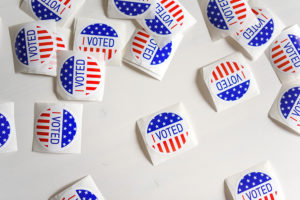What Does 2020 Hold for You?
 Photo by Element5 Digital on Unsplash
Photo by Element5 Digital on Unsplash As more and more Democratic candidates express their interest in running for president in 2020, this is the right time for you to think about your 2020 electoral plans too. Regardless of how you identify (atheist, humanist, agnostic, skeptic, freethinker, etc.) we need more candidates running for office who don’t hold theistic or other supernatural beliefs and who seek to govern and advance public policy based on evidence and reason. Why not you?
Although our community is growing dramatically, we’re still severely underrepresented in the political arena. With the help of the Center for Freethought Equality and Freethought Equality Fund PAC, we’ve seen a 900 percent increase in the number of state legislators who identify with the atheist and humanist community in the last two and a half years (from five prior to the 2016 elections to over fifty today). However, we need another 1,500 federal and state elected officials to reach parity with our population. By having the courage to run for office as a public nontheist you will help dispel the prejudice against atheists and humanists, encourage other nontheists to run for office, and make our democracy stronger.
In fact, the US Constitution wants you to run. Article VI Section 3 of the Constitution states “…no religious test shall ever be required as a qualification to any office or public trust under the United States.” And while seven states (Arkansas, Maryland, Mississippi, North Carolina, South Carolina, Tennessee, and Texas) are not so inviting, having provisions embedded in their constitutions that prohibit atheists from holding public office, these restrictions are unenforceable thanks to the 1961 US Supreme Court case Torcaso v. Watkins. This ruling was reiterated in 1997 at the South Carolina Supreme Court in Silverman v. Campbell.
Even as the Constitution and our courts prohibit religious tests for public office, being an atheist in the electoral arena has long been seen as a powerful political taboo in our nation—but not anymore!
Since 1958, Gallup has asked Americans if they would vote for a well-qualified presidential candidate who was an atheist. In the first poll only 18 percent answered in the affirmative. Four decades later (1999) a slim majority said they would vote for an atheist. In Gallup’s 2015 poll, 58 percent said they would vote for an atheist candidate.
A 2018 poll conducted by Lake Research Partners for the American Humanist Association and the Center for Freethought Equality suggests that being nonreligious, agnostic, or atheist should no longer be considered an impediment to a candidate’s electoral success.
The poll results demonstrate that religious identification is a less important factor than policy stances when voters make their decisions about which candidates to support. Asked if they would vote for a nonbeliever or nonreligious candidate who shared their policy positions, 72 percent of respondents said they would vote for the nonbeliever/nonreligious candidate and only 16 percent said they would not (11 percent didn’t know).
When just asking voters who already support Democratic candidates who are pro-choice and pro-marriage-equality, 74 percent said that a candidate being “nonreligious” or “agnostic” would make no difference in their vote. An additional 14 percent said that they would be even more likely to vote for the nonreligious or agnostic candidate. When the term “atheist” was used, support for the candidate only dropped marginally.
Not surprisingly, poll results did vary by political party. Forty-eight percent of Republicans said they would be less likely to vote for an atheist candidate who shared their political positions. Most younger Republicans (68 percent of those under thirty-five and 54 percent of those under fifty), however, said that a candidate’s atheism would make no difference to them.
With the growth of the nontheist community and the increasing acceptance of atheists by voters, the time has come for more atheist and humanist candidates to run for office. Our democracy is impoverished and the quality of our political candidates diminished if a quarter of the population is effectively removed from the electoral arena. The stigma that still exists will only be eliminated when Americans see respected and ethical nontheist leaders in public life.
We’ve already made progress. The Freethought Equality Fund endorsed 290 nontheists and allied candidates in 2018 and helped usher in the tremendous 900 percent increase in the number of elected officials who identify with our community. In 2017 Jared Huffman (D-CA), with an endorsement from the Freethought Equality Fund, became the second member of Congress to identify with the nontheist community (Pete Stark was the first in 2007). In April 2018 the Center for Freethought Equality and the American Humanist Association helped Jared Huffman and Jamie Raskin (D-MD) found the Congressional Freethought Caucus, an affinity and advocacy group for secular members of Congress. The Secular Coalition for America facilitated the creation of a secular caucus within the Texas Democratic Party and the national Libertarian Party in 2018 and is working to replicate this success across the country.
The democratic experiment that is the United States will be more successful when all Americans participate and are represented in our public institutions. The atheist and humanist community must be active and visible participants in the electoral arena.
And if you live in Louisiana, Mississippi, New Jersey, or Virginia, you don’t have to wait until 2020—state legislative elections are being held this year!
